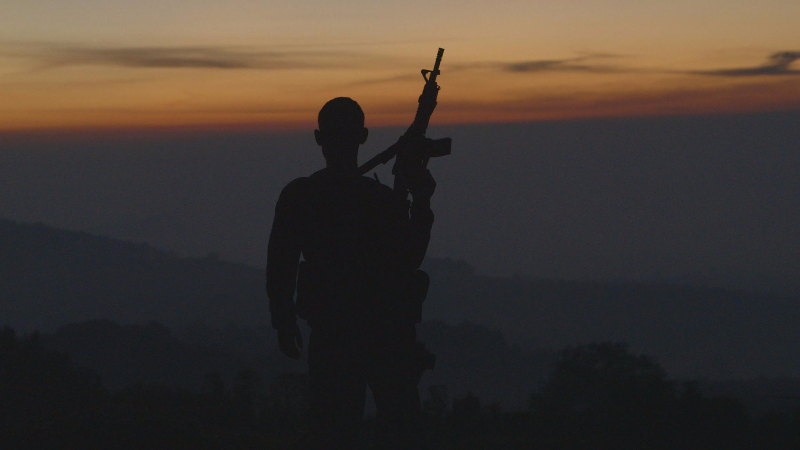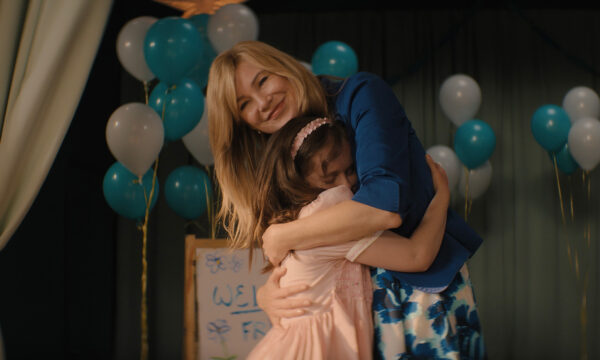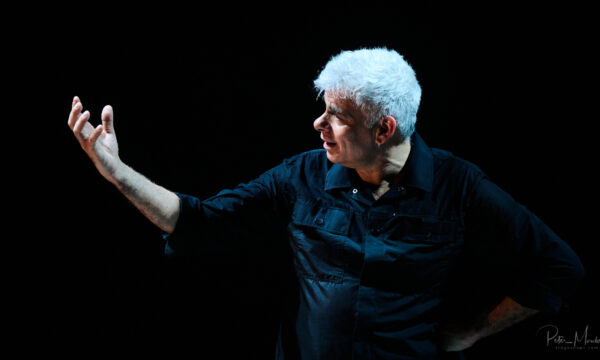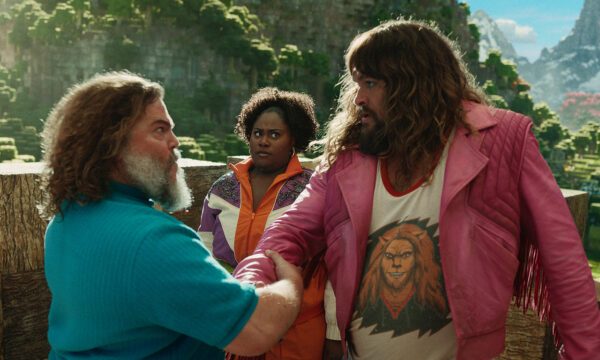Cartel Land: An interview with director Matthew Heineman

Cartel Land is a powerful documentary looking at vigilante justice in the never-ending fighting against drug cartel violence in Mexico and the US border region. The documentary charts the rise and fall of the popular vigilante Autodefensas movement in the southern Mexican state of Michoacan, providing an intimate portrait of leader Dr Jose Mireles. It also looks at the vigilante paramilitary group, Arizona Border Recon, and leader Tim “Nailer” Foley whose goal is to halt Mexico’s drug wars from seeping across the border. The Upcoming caught up with director Matthew Heineman to ask him some burning questions.
Where did the idea for Cartel Land come from?
I literally got the idea while riding the subway in New York, reading an article in Rolling Stone magazine called Border Madness about the Arizona vigilantes. It was a world I knew nothing about. I knew nothing about the border, I knew nothing about vigilantism, I knew nothing about the drug war, [but] it was a world that fascinated me. I spent many months speaking to Nailer and gaining his trust. I spent about three to four months filming with him over the summer of 2013, and then my father sent me an article about the Autodefensas and right when I read that article, I knew I wanted to create this sort of parallel story about vigilantism on both sides of the border. I think on an intellectual level what fascinated me was [asking] what happens when institutions fail, what happens when citizens feel like they are forced to take the law into their own hands. And then the ramifications of what happens when they do so.
How did you get such unfettered access to the Autodefensas and Dr Mireles?
After reading that article that my father sent to me, and it should be noted that he didn’t send me that article as if to say I should go there. It was more like “hey, here’s something interesting,” and then I made the connection, and it took a couple of weeks for my mom to start talking to my dad after that. So I read that article, and then I read a few more articles, one of them was a profile piece of Dr Mireles in the Washington Post, so I reached out to the journalist and asked her about him. She said: “he’s the single most interesting person I’ve ever written about,” and as a filmmaker those are nice words to hear. So she introduced me over email to the doctor and I think the next day I was on the phone with him and he said “come on down.” Two weeks later I was in Mexico filming.
I think there are several things that allowed me to get the access that I was able to get. Firstly, being very honest and truthful with my intentions. I didn’t have an agenda or goal in mind. I wanted to tell a story through the eyes of Dr Mireles, and the eyes of the people on the ground. And I think they responded to my openness and that I wasn’t coming in with a preconceived notion about who they were. There was also the time factor. I didn’t just parachute in and out for two or three days, I was there for almost nine months, on and off, so I was able to develop really deep relationships with the doctor and others, develop storylines and character arcs, and these relationships helped me to get into places that I could never have gotten access to if I was only there for a day or two. Lastly, they were risking their lives for what they believed in, and I was dumb enough to tag along with them so there was a level of respect that my crew and I were risking our lives to tell their story as well.
You document the rise of the Autodefensas, and then subsequently what happens with the movement. Was the intention to chronicle this kind of arc, or was it more a case of “we’re going to go and see what happens?”
“We’re going to go and see what happens.” There’s nothing scripted or preordained about the film. The film unfolded and unravelled in a way that I never could have imagined. At first I thought I was telling the story of good vs evil, or good guys vs bad guys, but over time the lines between good and evil became quite blurry, and that fascinated me. I almost became obsessed with trying to understand who these guys were and what was really happening.
You filmed gun battles between the Autodefensas and the cartels, you witnessed torture, and you visited a drug lab in the middle of the desert which was guarded by armed men – did you ever feel like your life was in danger?
I’m not a war reporter, so I’ve never been in any situation like this before in my life. My last film was about healthcare in the US which is a different type of battle, so yes it was absolutely terrifying. There were countless times when I feared for my life, but I felt like it was a very important story to tell and I felt a huge duty and obligation to tell this story.
Did you feel like you were in danger from one side or another particularly? Filming the Autodefensas, you would have been constantly surrounded by heavily armed men operating, effectively, outside of the law?
It was more from the situations I was in. When you’re in a shootout, it doesn’t matter if you’re wearing a flak jacket, if one bullet is going in the direction of your head then it’s game over. So there was a very imminent danger and fear. And then obviously there’s the fear of kidnapping, or people turning against you, or people not wanting you to do things, or people threatening you. There are countless times…when we were surrounded and people were trying to take my camera away from me, or where people threatened or tried to intimidate me. But thankfully nothing ever happened. Knock on wood.
You say you filmed for months and months with the Autodefensas, what was the most interesting thing that didn’t make the edit?
We included the most important information to tell the story, but what we didn’t include were some characters who we just didn’t have time to develop. In the end, it really became a character portrait of Nailer and Dr Mireles, which is what I originally intended. There were also certain scenes that we couldn’t include. There was a very dramatic scene after the shootout between the Autodefensas and the cartels in which they capture two cartel assassins. They are then taken to this local police station and all the family members came and identified them and beat them up. That was a very dramatic and emotional scene.
You managed to get access to the crucial Autodefensas leadership meeting where they discussed their response to the Mexican government’s offer to either join the Ministry of Defence or face arrest. You include an audio of that meeting in the documentary, but you did not film it. Did they know you were recording?
No. I tried to get in to film it with the camera, but they wouldn’t let me in with my camera so I recorded audio. It was extraordinarily important. That scene was integral to the film, to see the breakdown of the Autodefensas and to see that final crumbling.
Mireles is a complex figure. He wants the best for his people, you show some scenes of him with his family, but he is also seen having what is effectively an affair and ordering violence. What was the Autodefensas’ response to this?
Dr Mireles has been unable to see the film for reasons that you can surmise [Mireles is currently in prison in Mexico on charges relating to his role with the Autodefensas]. I think it’s easier to judge from the luxurious confines of a club in London, but this is a war. War is dirty. War is complicated. War is messy. I tried not to shy away from that. I didn’t want to put these characters, or this movement, in a nice neat little box. He’s good. He’s bad. This is good. This is bad. I wanted to show the complexity of vigilantism.
Are you afraid that the Mexican government could use scenes from your documentary against Mireles?
It’s something that we thought about a lot. We consulted a lot of different people about it: journalists, lawyers. We didn’t just haphazardly throw it into the film. Every single frame, every single moment, was meticulously thought through, and especially those moments that you are referring to. Ultimately we decided that they couldn’t use that against him and so we felt comfortable including it. It was something that we captured and something that happened so we also had a responsibility to show it as well. We didn’t want to be haphazard and reckless with what we showed [in the documentary], we were very conscientious in what we showed and didn’t show.
You said that the documentary is a character portrait of Nailer and Mireles. Do you equate between them and their causes?
I think the differences [between them] are stark. And the similarities are too. On a basic level, Nailer and Dr Mireles are both 55-year old men, they both believe that the government has failed them, they both have taken the law into their own hands to fight for what they believe in, but the circumstances are quite different. In Mexico, the violence is visceral. It’s real. More than 80,000 people have been killed since 2007, more than 20,000 people have disappeared since 2007, whereas in Arizona that violence has not happened. That violence, that fight, is much more theoretical, it’s much more a paranoia that these Mexican drug wars will seep their way across our border, and I hope that those differences are quite obvious in the documentary.
Did you feel equal sympathy for both men and their causes? Or more sympathy for Mireles over Nailer, for example?
I think my sympathy is irrelevant. Some filmmakers put themselves in their film, either on camera or off camera. Some film makers use voiceover. Some filmmakers write scripts. That’s just not my style. I don’t find myself that interesting. I believe in the type of filmmaking where you let the story dictate where you go, where you tell the story through the eyes and words of the characters themselves.
Cartel Land has received great critical and popular attention, including winning Best Director and Best Cinematography for the US documentary categories at the Sundance Film Festival. Were you expecting this kind of response?
You make these films, you go off to corners of the world and shoot films like this and then put yourself in a dark room with a screen and try to make sense of it and you never know how people are going to react. I knew we had a special story. I knew we had great scenes and great characters. It was very humbling to get into the festival and to receive those two awards, so we’re very grateful and humbled by the response the film has had, both critically and by audiences.
What’s next for you? Any projects upcoming, or are you just focusing on promoting the film?
I’ve been travelling with the film and promoting; it has been a bit of a full time job. I’m developing a few films as well but for right now I’m really focusing on getting Cartel Land out in the world.
Mahmud El Shafey
Cartel Land is released nationwide on 4th September 2015, read our full review here.
Watch the trailer for Cartel Land here:


















Facebook
Twitter
Instagram
YouTube
RSS